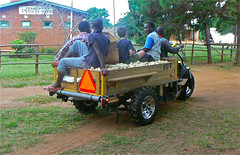
In a good year, the harvesting season for maize starts in April, and it moves slowly north where planting season started later in the year. It is a happy time as it marks the transition from a time of major food shortage to a time of plenty. Malnutrition levels drop drastically. It is, however, a time when many farmers face difficulty in transporting their produce from the fields to their homes. Farms are normally far from the village. Few farmers own ox-carts, or bicycles, and they must carry the grain on their heads.
In recent weeks the harvest has started. Namikango Mission is in the process of bringing in its harvest of maize. Unlike previous years, when the transportation of grain was a challenge, this year thanks to the Malawi Project and its timely and valuable donation of the Basic Utility Vehicle, the grain is being easily moved from field to warehouse.
The BUV is a multipurpose vehicle that can be used, not only for grain transportation, but also for expectant mothers to be transported to the nearby maternity clinic. In a country where much of the population lives on less that a dollar a day, acquisition of an ox-cart or bicycle is unachievable. This leads to countless challenges in transportation. When one visits Malawi for the first time one is likely to see thousands of people walking on foot, both in rural and urban areas.
The BUV has proven to work exceptionally well where road conditions are not good, and it can also play a role in bridging the communication gap in rural areas. It is a country where 80% of the population lives in extremely remote areas, and in adverse poverty. The major mode of transportation is walking for long distances. The availability of basic utility vehicles can transform people’s lives for the better.
The BUV, one of three units delivered by the Malawi Project, and the manufacturer, is drastically reducing total expenditures for the mission in terms of time, and provision of service that would be delayed with its absence. Maternal related deaths that arise due to delays in getting medical attention from the clinic are likely to be reduced in villages around the medical facility because of the availability of this vehicle.
– Wilson Isaac Tembo
